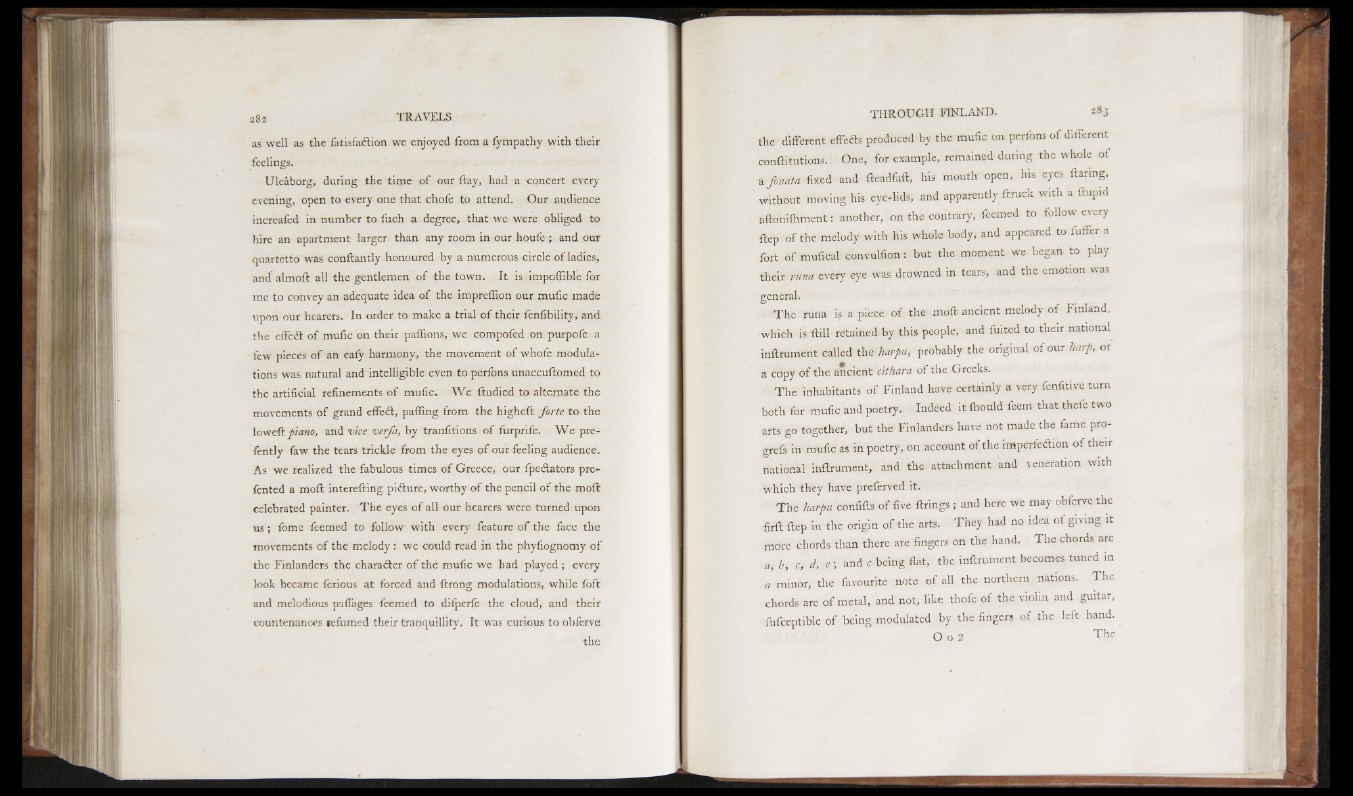
as well as the fatisfa&ion we enjoyed from a lympathy with their
feelings.
Uleaborg, during the time o f our ilay, had a concert every
evening, open to every one that choie to attend. Our audience
increafed in number to iuch a degree, that we were obliged to
hire an apartment larger than any room in our houfe ; and our
quartetto was conilantly honoured by a numerous circle o f ladies,
and almoil all the gentlemen o f the town. It is impofiible for
me to convey an adequate idea o f the impreffion our mufic made
upon our hearers. In order to make a trial o f their ienfibility, and
the effed o f mufic on their pafiions, we compofed on purpofe a
few pieces o f an eafy harmony, the movement o f whofe modulations
was natural and intelligible even to perions unaccuftomed to
the artificial refinements o f mufic. W e itudied to alternate the
movements o f grand effed, paffing from the higheil forte to the
loweil piano, and wee verfa, by tranfitions o f furprife. W e prefen
tly faw the tears trickle from the eyes o f our feeling audience.
As we realized the fabulous times o f Greece, our fpedators pre-
fented a moil interefting pidure, worthy o f the pencil o f the moil
celebrated painter. The eyes o f all our hearers were turned upon
u s ; iome feemed to follow with every feature o f the face the
movements o f the melody: we could read in the phyfiognomy o f
the Finlanders the charader o f the mufic we had played ; every
look became ferious at forced and ilrong modulations, while loft
and melodious paflages feemed to diiperfe the cloud, and their
countenances refumed their tranquillity. It was curious to obferve
the
the different eifeds produced by the mufic on perfons o f different
conftitutions. One, for example, remained during the whole of
tijbnatà fixed and ileadfail, his mouth open, his eyes flaring,
without moving his eye-lids, and apparently llruck with a flupid
ailoniihment : another, on the Contrary, feemed to follow every
ilep o f the melody with his whole body, and appeared to fuffer a
fort o f mufical convulfion : but the moment we began to play
their nma every eye was drowned in tears, and the emotion was
general.
T he runa is a piece o f the moil ancient melody o f Finland,
which is ilill retained by this people, and fuited to their national
inilrument called the harpu, probably the original o f our harp, or
a copy o f the ancient cithàra o f the Greeks.
T h e inhabitants o f Finland have certainly a very fenfitive turn
both for mufic and poetry. Indeed it ihould feem that thefe two
arts go together, but the Finlanders have not made the fame pro-
grefs in mufic as in poetry, on account o f the imperfection o f their
national inilrument, and the attachment and veneration with
which they have preferved it.
The harpu confiils o f five firings ; and here we may obferve the
firft ilep in the origin o f the arts. They had no idea o f giving it
more chords than there are fingers on the hand. T he chords are
a, b, c, d, j j and c being flat, the inilrument becomes tuned in
a minor, the favourite note o f all the northern nations. T he
chords are o f metal, and not, like tliofe o f the violin and guitar,
fufceptible o f being modulated by the fingers o f the left hand.
O o 2 The